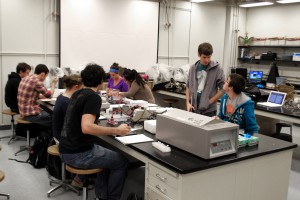Have you ever taken a class that had a lab requirement? Better yet, have you ever taken a class that had a lab in addition to a workshop or recitation?
Most people will say that working in a lab is a rewarding experience. Unfortunately, humanities majors on our campus do not get to experience the joy of having laboratory sessions on top of actual lectures.
To rectify this inequality, all majors in the humanities will be required to take both labs and recitations to enhance their learning experience, starting in the fall of 2013.
There will likely be complaints at first, but ask any science major — and even a few social science majors — and they will tell you how much they love going to class outside of class. The amount of time they get to spend doing what they love is amazing — there is no better way to spend three hours of your day than in a lab, freaking out because you are doing an experiment wrong.
The best part isn’t even going to lab, though. Spending hours afterward writing the lab report is where the fun really starts.
Here at UR we take academics very seriously. We want our students to graduate with the skills and knowledge that they will need in real life situations. If your life ever depends on formatting your lab report properly, will you be ready?
And what about the recitations? You walk into the classroom thinking that you have grasp on everything, and then you get to deal with problem sets that make you realize you really didn’t understand anything in the first place. At recitation, you really get to dig deeper into what you already should have learned in class.
Then, after you take your first test, you will realize that all the material was actually from that recitation, not lectures.
Recitation entails more than just sitting around for two hours desperately trying to get a problem done so you can leave. It is actually about understanding the material to a greater extent. So really, if you add all these hours up, you dedicate at least five hours outside of lecture to something that you have proclaimed to be really passionate about — on your major declaration form, at least.
And if you aren’t actually passionate, suck it up, it’s still required for you to graduate and it is a prerequisite for the classes you actually want to take. It’s also an extra five hours of your week for no credit — a relief for any student worried about overloading their semester.
One might say, “What can humanities majors possibly do with labs and recitations?” Well, how about getting some practice in writing a 20- to 40-page book every week and getting graded for format, grammar and plot? Analyzing that movie you just watched or the book you just read for an additional two hours in the new required lab also works.
Any material covered in lab will be so ingrained into your head by that point that the next time you read anything by Charlotte, Emily or Anne Brontë, you won’t think about how Comedy Central said that the Brontë sisters were like the Kardashians of the 19th century. Instead, you’ll be more likely to recall that they were all independent young ladies with minds of their own.
Or how about J.R.R. Tolkein? If you ever take a class where you have to analyze his works, then in recitation you will probably watch the movies to get a deeper understanding of the books and analyze his ideas even further.
And so, to create an even more rewarding educational experience for all of its students, UR has once again raised the bar. Gone are the days of inequalities between majors in the sciences and humanities.
Whether you are a humanities major or not, the introduction of labs for all classes will ensure that you’re in for the best four educational years of your life.
Panda is a member of the class of 2015.





